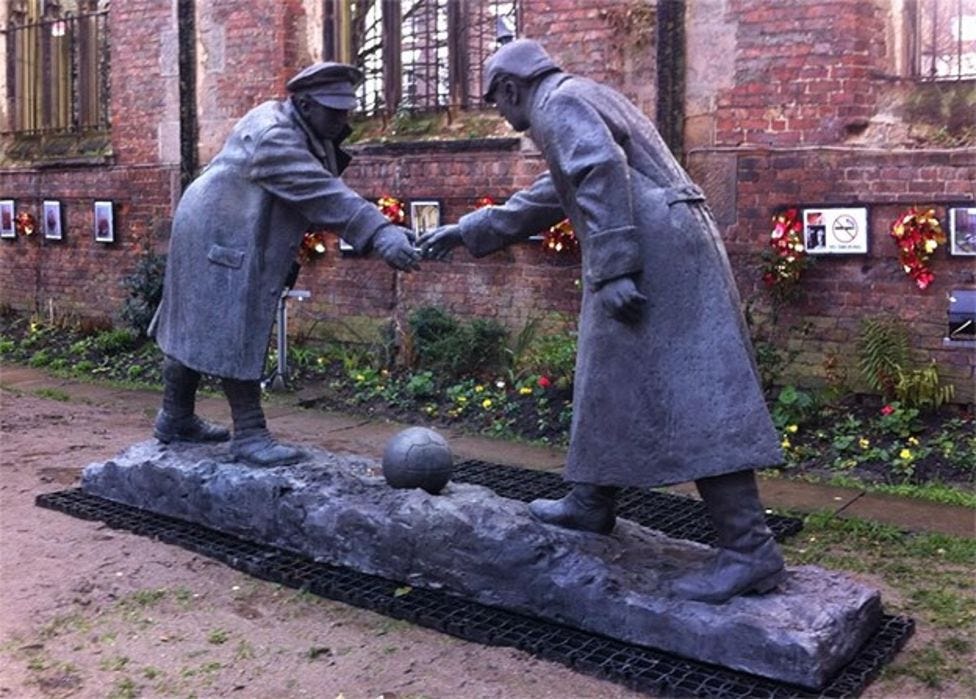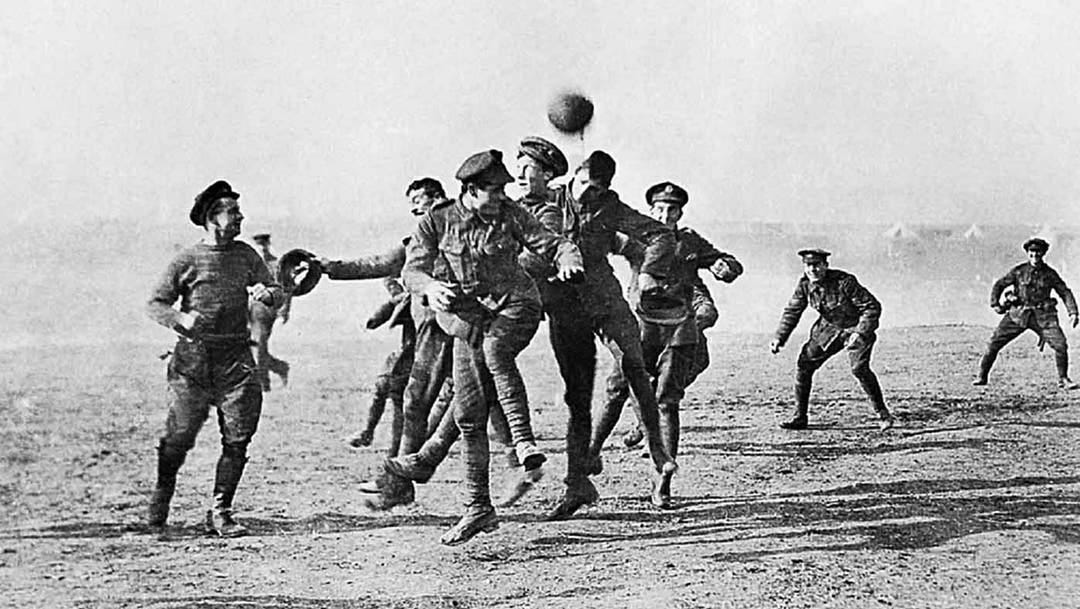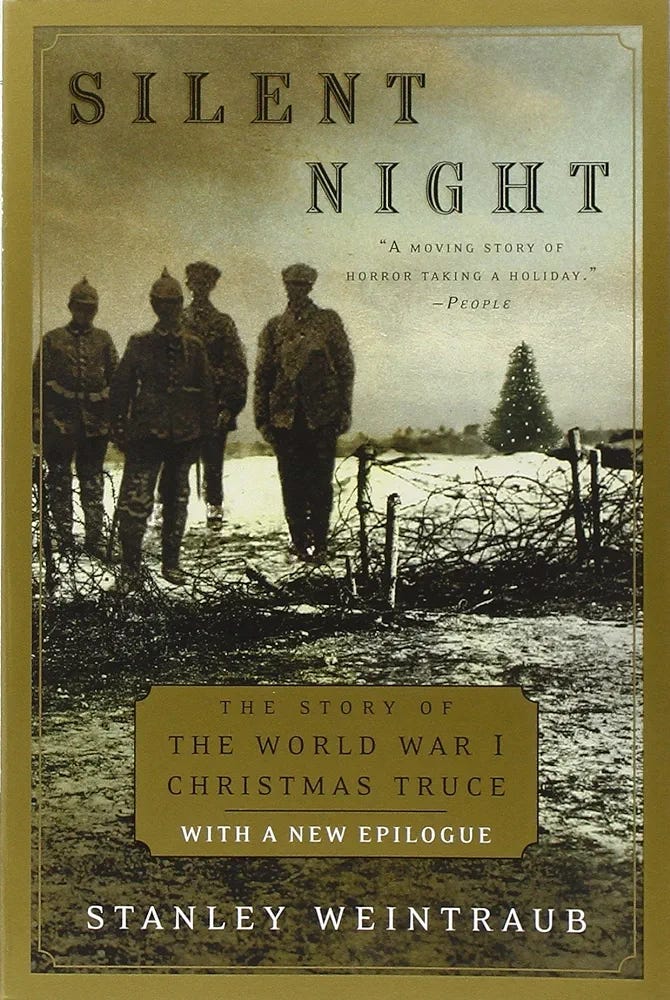The Christmas Truce Of 1914
Leaders always start wars they won't have to actually fight. The "men of good will" who had to do the fighting found they were not so different from each other.
With Joe Biden and his handlers desperately trying to get us into WWIII with Russia and threatening to send American troops to Ukraine unless we pay his Ukrainian blackmailers more money, I thought it a good time to remember when men disobeyed their orders and stopped killing each other to celebrate the gift of ultimate love.

World War I timeline
Archduke Franz Ferdinand of Austria and his wife, Sophie, were assassinated by Bosnian Serb nationalist Gavrilo Princip in Sarajevo on June 28, 1914. There was already tension in the Balkans. Princip and other nationalists were fighting to end Austro-Hungarian rule over Bosnia and Herzegovina.
There were two sides based on their alliances. The Allies consisting primarily of France, Great Britain, Italy, Russia, and later the United States. The Central Powers, primarily comprised of Austria-Hungary (the Habsburg Empire), Germany, and the Ottoman Empire (Turkey).
The war essentially began the day of the assassination and ended November 11, 1918. The world had never seen horror on such a scale. It was the most destructive war to date in world history till WWII, with an estimated 16 million military and civilian deaths from all causes, plus 20 million more military crippled or severely wounded. This was first time Mustard gas and other horrific but “effective” weapons like tanks and planes to bomb and strafe troops with machine guns.
From August till December of 1914, 116,000 German and 189,000 Austro-Hungarian soldiers were killed. 16,200 soldiers of the British Expeditionary Force and 30,000 Belgians killed. 300,000 French soldiers were horrifically killed. While on the Eastern Front, Russian causalities were nearly a jaw dropping 2 million.
How did the truce start?
A well written thoroughly researched and meticulously documented account was written by historian Stanley Weintraub:
British and German soldiers had been fighting and killing each other from muddy and in sometime flooded trenches in torrential rain barely 30 yards apart in some spots. On Christmas Eve, the rain stopped. The truce was spontaneous and in sporadic pockets along the 500 mile front. Almost all accounts credit the Germans as the initiators.
For example, in his book, Stanley Weintraub credits Walter Kirchhoff, a German Officer and sometime member of the Berlin Opera and his singing of “Silent Night” in both German and English with encouraging the exchange of songs, greetings and gifts between the opposing soldiers. These included chocolates, cigarettes, belt buckles and even a German gift to the British of two kegs of beer because both groups agreed the French beer was too awful to drink.
There are many essays and accounts of the miraculous event.
From: History.com written by A. J. Baime and Volker Jannsen:
British machine gunner Bruce Bairnsfather, later a prominent cartoonist, wrote about it in his memoirs. Like most of his fellow infantrymen of the 1st Battalion of the Royal Warwickshire Regiment, he was spending the holiday eve shivering in the muck, trying to keep warm. He had spent a good part of the past few months fighting the Germans. And now, in a part of Belgium called Bois de Ploegsteert, he was crouched in a trench that stretched just three feet deep by three feet wide, his days and nights marked by an endless cycle of sleeplessness and fear, stale biscuits and cigarettes too wet to light.
“Here I was, in this horrible clay cavity,” Bairnsfather wrote, “…miles and miles from home. Cold, wet through and covered with mud.” There didn’t “seem the slightest chance of leaving—except in an ambulance.”
At about 10 p.m., Bairnsfather noticed a noise. “I listened,” he recalled. “Away across the field, among the dark shadows beyond, I could hear the murmur of voices.” He turned to a fellow soldier in his trench and said, “Do you hear the Boches [Germans] kicking up that racket over there?”
“Yes,” came the reply. “They’ve been at it some time!”
The Germans were singing carols, as it was Christmas Eve. In the darkness, some of the British soldiers began to sing back. “Suddenly,” Bairnsfather recalled, “we heard a confused shouting from the other side. We all stopped to listen. The shout came again.” The voice was from an enemy soldier, speaking in English with a strong German accent. He was saying, “Come over here.”
One of the British sergeants answered: “You come half-way. I come half-way.”
19-year-old British lieutenant Charles Brewer with the Bedfordshire Regiment of the 2nd Battalion saw a glistening light on the German parapet less than 100 yards away.
Also at History.com from Christopher Klein:
Warned that it might be a trap, Brewer slowly raised his head over the soaked sandbags protecting his position and through the maze of barbed wire saw a sparkling Christmas tree. As the lieutenant gazed down the line of the German trenches, a whole string of small conifers glimmered like beads on a necklace.
Brewer then noticed the rising of a faint sound that he had never before heard on the battlefield—a Christmas carol. The German words to “Stille Nacht” were not familiar, but the tune—“Silent Night”—certainly was. When the German soldiers finished singing, their foes broke out in cheers. Used to returning fire, the British now replied in song with the English version of the carol.
Accounts from British and German soldiers
First the Germans would sing one of their carols and then we would sing one of ours, until when we started up ‘O Come, All Ye Faithful’ the Germans immediately joined in singing the same hymn to the Latin words Adeste Fideles. And I thought, well, this is really a most extraordinary thing – two nations both singing the same carol in the middle of a war. - Pvt. Albert Moren of the Second Queens Regiment
We shook hands, wished each other a Merry Xmas and were soon conversing as if we had known each other for years. Here we were laughing and chatting to men whom only a few hours before we were trying to kill! - British Corporal John Ferguson
My company happened to be in the firing line on Christmas eve, and it was my turn…to go into a ruined house and remain there until 6:30 on Christmas morning. During the early part of the morning the Germans started singing and shouting, all in good English. They shouted out: “Are you the Rifle Brigade; have you a spare bottle; if so we will come half way and you come the other half.’”
Later on in the day they came towards us and our chaps went out to meet them…I shook hands with some of them, and they gave us cigarettes and cigars. We did not fire that day, and everything was so quiet it seemed like a dream. - British rifleman J. Reading in a letter to his wife
Where there was enough flat ground between the trenches that had not been cratered by bombs, pick-up soccer games were played. If they didn't have a ball, they used tin cans or sand bags.

We marked the goals with our caps. - German Lieutenant Johannes Niemann
Eventually the English brought a soccer ball from their trenches, and pretty soon a lively game ensued. How marvelously wonderful, yet how strange it was. The English officers felt the same way about it. Thus Christmas, the celebration of Love, managed to bring mortal enemies together as friends for a time. - German Lieutenant Kurt Zehmisch, 134 Saxons Infantry, a schoolteacher who spoke English and German from his diary found in 1999.
The prize for one of the games was a bottle of Schnapps!
By Christmas Eve, some lower-ranking British officers had begun ordering their men not to fire unless fired upon. This policy came to be known as “live and let live,” and it would be adopted on an ad hoc basis throughout the war, particularly in less active sectors. Like all implementations of “live and let live,” the officers’ decisions were made without any authorization from above.
The leaders of all armies were horrified
On Dec. 7, 1914, Pope Benedict implored leaders of the battling nations to hold a Christmas truce, asking "that the guns may fall silent at least upon the night the angels sang." This was officially ignored by all sides.
There were rumors that a ceasefire might occur among the men on the front and generals absolutely forbade it and promised severe punishment. Despite the threats, it still happened. This caused troops to be transferred out for fear they wouldn't fight anymore, which was not the case. As one unknown German soldier put it when saying goodbye to his new British friends, “today we have peace. Tomorrow you fight for your country; I fight for mine. Good luck.”
“Thou shall not kill” is actually an incorrect translation
Hebrew, where translations of the Old Testament came from, actually says “Thou shall not murder”. You have every right to defend your life or some else's all the way up to killing if necessary. It is not the normal human condition to want to harm and murder people, taking into consideration that we do have actual monsters walking among hardly worth being called human.
Why do you think Veterans of all wars have such a difficult time dealing with the sometimes unspeakable things they were ordered to do? My wife and I had a friend, now gone, who at 18, was a Marine Corp. sniper in Viet Nam. Wrap your mind around that. 18 years old and your job is to assassinate whoever your superiors order! One of my jobs was caretaker at a ranch where the owner sold parcels of land. I was to meet a buyer and show him a parcel and our friend Tim happened to stop by. They got to talking and realized they were both stationed in Viet Nam in the same part at the same time. The buyer's job was to infiltrate villages, get intelligence, then get it back so guys like Tim could be told who to assassinate! They compared notes and experiences for over two hours. It was fascinating and horrifying to hear the experiences of two young men. One surprising thing I learned was that American officers sometimes defected to North Vietnam. They were always top on Tim's list!
Using the Christmas Truce of 1914 to teach American servicemen humanity
Joseph D. Eanett has spent the last 12 years on active duty as a U.S. Air Force officer in the security forces and intelligence career fields. He is currently assigned as an instructor of naval history at the U.S. Naval Academy.
I find remarkably deep meaning in the events of the Christmas Truce for no other reason than that among so much destruction, no amount of hatred or bitterness could overcome their common humanity. This fact has compelled me to share this story with my airmen, and more recently, my midshipmen, every December. Among the roughly 2,000 servicemembers I have worked with in my career so far, there is a lasting impact for those who had the patience to read or listen. Each time, I recount the details of the truce and the horrors of the Western Front, I try to share the following lesson: Duty and humanity are virtues that bind all in the profession of arms, but they exist in tension with each other and must be precariously balanced.
It is a difficult job. As service members, we stand ready to conduct violence on behalf of others. The reason we exist is to hurt people and break things. It is not a responsibility to be taken lightly, nor something to be considered in jest. We stand in defense of others, whether as soldiers or marines with the power of life or death over insurgents, or as airmen and sailors ready to release thousands of nuclear weapons at a moment’s notice. That level of responsibility, to the nation, to each other, and to mankind, is incredible and speaks to the trust placed in us by the citizens of the world.
My two wishes for you
May you have in your heart “The peace of God, which passes all understanding,” today and always. We are all part of a plan. Play your part with confidence.
If you don't have it already, may you develop a sense of gratitude today and always. For starters, do you even realize the miracle that you actually even exist?
Reflecting at this time, I am greatful for all the experiences in my life, good and bad, that have brought me to this point in my existence. For all the wonderful and awesome souls I have encountered in my life.
I am grateful for my subscribers and others who find my work worthy of reading. I am deeply honored by those who think it worthy of paying for and hope to see many more in the coming year. I am grateful for all the people I have met in my journey on Substack and that it still exists as a place of free speech. Guard that freedom of speech here and everywhere else in your life jealously against all the forces we see arrayed to take it from you! Once it is gone it will never return!
Most of all, I am grateful for my wife and grateful for her urging me on this journey.
A gift for you. Enjoy!
My wife found these guys from Australia when looking for Ringo Starr's version of “Little Drummer Boy”, which is fabulous. Their energy is awesome and catches you up in their obvious joy celebrating that God lowered Himself and became a man to save us.
And in the same region there were shepherds out in the field, keeping watch over their flock by night. And an angel of the Lord appeared to them, and the glory of the Lord shone around them, and they were filled with great fear. And the angel said to them, “Fear not, for behold, I bring you good news of great joy that will be for all the people. For unto you is born this day in the city of David a Savior, who is Christ the Lord. And this will be a sign for you: you will find a baby wrapped in swaddling cloths and lying in a manger.” And suddenly there was with the angel a multitude of the heavenly host praising God and saying,
“Glory to God in the highest,
and on earth peace, good will among men!” - Luke 2: 8-14





"I am grateful for all the people I have met in my journey on Substack and that it still exists as a place of free speech."
You always wonder if there's people who have a 3C point of view out there (Christian, Constitutional, conservative) but we're slowly finding one another despite the roadblocks and naysayers.
Like fine wine, you get better and better. Love the history lesson. I am working on an essay about how the US government nationalized the railroads during WWI - stay tuned.